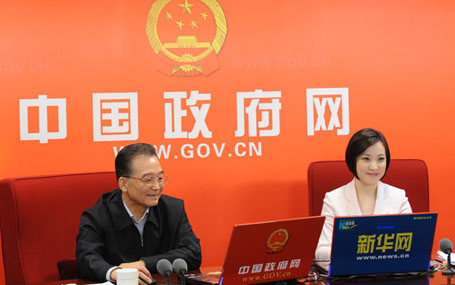|

|
|
Chinese Premier Wen Jiabao (L) visits GOV.cn, the official web portal of the Central People's Government of the People's Republic of China, and Xinhuanet.com, the online news service of Xinhua News Agency, in Beijing on Feb. 28, 2009. [Xinhua]
|
Chinese Premier Wen Jiabao arrived at the downtown building housing the central government website and Xinhua website for an online interview and chat with netizens Saturday afternoon.
The central government website (www.gov.cn) and the Xinhua News Agency website (www.xinhuanet.com) will jointly interview Wen, which will be shown live in both text and video.
One hour before the live webcast, more than 38,000 questions have been posted at the online forum at xinhuanet, ranging from employment to health care and everything in between.
This will be the first online chat involving Wen and the public. It follows a brief online Q&A by President Hu Jintao in June last year.
China's Internet population has dramatically changed the political landscape of the country. Both Hu and Wen said they personally spend time online to gauge public concerns.
In January 2007, Hu, also general secretary of the CPC Central Committee, urged senior officials at a lecture attended by members of the CPC Central Committee Political Bureau, "to improve their Internet literacy and use the Internet well so as to improve the art of leadership".
According to the China Internet Network Information Center, in January, the number of Chinese netizens surpassed 300 million. That is 23.8 percent of the population, or the most web users in the world from any one country.
Beijing-based Renmin University China Media College Vice President Yu Guoming told Xinhua that Chinese officials and scholars felt obliged to notice citizens online views as a way to learn about the social situation and people's thoughts.
"Online opinions have become an indispensable part of public voices," Yu said. "The Internet offers the most convenient vent for the voices of common people, without any editing."
"Conventional media usually convey only one kind of views but the Internet allows dissenting views as long as they are in line with laws," he said.
Netizen Questions
While many welcomed Premier Wen's upcoming chat with the public, a great deal of others expressed complaints, warnings and suggestions for government work on the two portals.
One netizen named "representative of Shenzhen enterprises" said the international financial crisis has affected many enterprises in the south China's city, China's first special economic zone.
"I was wondering when government's economic stimulus plans could take effect?" the netizen asked.
Another netizen asked Wen whether the government will consider introducing more pro-active policies for attracting overseas talent against the backdrop of economic sluggishness in many developed economies.
China's gross domestic product (GDP) grew 9 percent year-on-year last year, the lowest since 2001, when an annual rate of 8.3 percent was recorded.
Another netizen wrote about the tuition fee of roughly 300 yuan (44 U.S. dollars) in some local primary schools, which was against the state policy of free nine-year compulsory education. He also mentioned high electricity rates in rural areas, leaving people unable to afford daily use of home appliances even after purchasing them.
One person criticized soaring real estate prices in recent years and asked why macro economic policies did not work for curbing unreasonable price hikes.
One asked for more favorable policies for private business owners and an effective way to protect their interests.
Some netizens raised personal questions to Wen. "What sports do you like?" one asked. "As a premier, how much is your salary?" another netizen named Jason asked in English. And "how long do you sleep a day?" another added.
The websites advise that each question should be no more than 100 Chinese characters to ensure smooth on-line flow.
Netizens also proffered tens of thousands of questions as well as advice for Wen on several Chinese news portals, which organized special bulletins ahead of the legislature and the top advisory body's annual sessions.